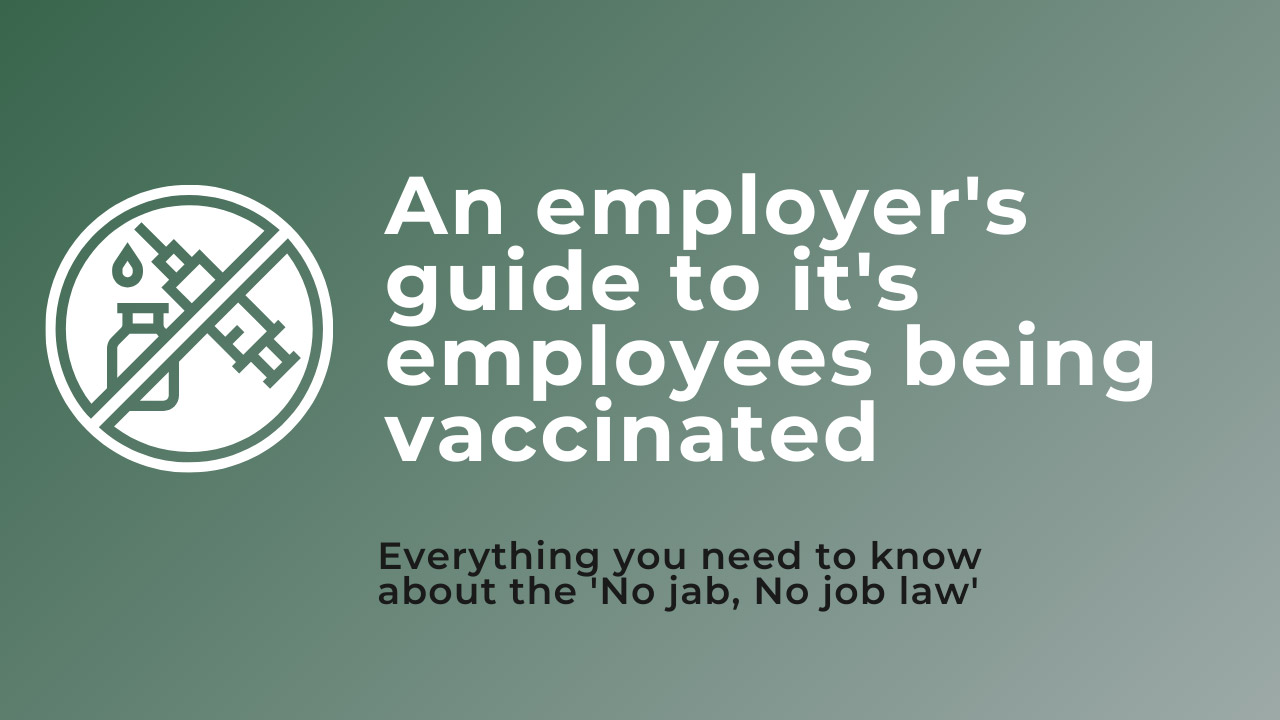An employer’s guide to its employees being vaccinated
On 11 November 2021, all care home workers in England MUST be vaccinated. In addition, care home providers must ensure that nobody enters the home unless they fall into one of the exceptions of:-
- Being a care home resident
- Being a friend or relative of a resident
- Being an emergency provider or providing urgent maintenance
- Being a child under 18
- Visiting a dying resident
- To provide support to a resident following a bereavement
So what does this mean for care home providers? We take a look at the frequently asked questions below.
Timelines
When should we be warning staff that they may lose their job if not vaccinated?
Now! Any warning letter should also state that a refusal to be vaccinated may also amount to a gross misconduct offence.
When should all staff have had their first vaccine by?
16 September 2021.
When should all staff have had their second vaccine by?
11 November 2021. There is no stipulation on how long before 11 November that the second vaccine has to have been given so in theory, as long as it has been administered before 11 November, your employee will count as having been vaccinated.
Entering the Home
Does it count if workers have had one vaccine?
No. Staff must have had a completed course of one of the approved vaccines. This includes the second vaccine as well as the first.
How do I check that entrants to the home are vaccinated?
You can check the card issued by the vaccination clinic. We recommend that you retain a copy of your own to check against for forgeries. You can also ask for a more reliable approval on a person’s NHS app which confirms vaccination status.
What do I do if someone wants to enter who is not vaccinated?
Refuse them entry! Unless they are in the list of 1-6 above or are medically exempt.
What is a medical exemption?
There are a range of medical exemptions but guidance for staff to certify their medical exemption is still being developed by the government. At this stage we can only say that any medical exemption must be properly certified by a clinician, it cannot simply be an employee’s word for it.
Recruiting
Can we stipulate on a job advert that applicants must be vaccinated?
Yes! You can but it would be sensible to say “must be vaccinated unless able to prove medical exemption” to avoid discrimination claims.
Can we ask new recruits for proof that they have been vaccinated?
Yes! You should also ask for “proof that they have been vaccinated, or have a medical exemption” to avoid discrimination claims.
Vaccine Refusals
What if a pregnant or breastfeeding employee is refusing the vaccine?
At the time of writing (August 2021) it makes no difference. Pregnant and breastfeeding women are recommended to receive the vaccine. It is not a medical exemption and therefore any pregnant or breastfeeding employee who refuses can face dismissal.
A dismissal in these circumstances should follow a properly convened disciplinary process and it will still carry a discrimination risk. Therefore, any home needing to take this course of action should justify the requirement for vaccination as part of the disciplinary process.
Prior to the dismissal, it would also be sensible to consider whether there is any other work outside the care home that the employee could carry out in the interim period. If, for example, she could work at her own home on administration duties, it would be reasonable to implement that as an alternative to dismissal.
What if an employee is refusing the vaccine on religious or ethical grounds?
At the time of writing (August 2021) it makes no difference. Religious or ethical grounds is not a medical exemption and therefore an employee who refuses on these grounds can face dismissal.
A dismissal in these circumstances should also follow a properly convened disciplinary process and it will still carry a discrimination risk. Therefore, any home needing to take this course of action should justify the requirement for vaccination as part of the disciplinary process.
We also anticipate that given the demographic of workers and employees in the care home, this could create a bottleneck of issues if many people of the same race refuse. We, therefore, recommend that homes start planning for potential staffing shortages now.
What if a vegan employee is refusing the vaccine?
Being a vegan is not a medical exemption so employees still need to be vaccinated. There is no discrimination risk in dismissing a vegan unless they are an ‘ethical vegan’ and in which case you simply need to justify the legal requirement for vaccination in the disciplinary process.
What if an employee is refusing the vaccine on medical grounds?
If an employee is refusing on genuine and evidenced grounds of medical exemption (as detailed above), they can continue working. You can impose additional PIP requirements to consider whether to move the employee to a department that is less resident-facing to minimise risk.
Ending Employment & Notice Period
What do I do about workers or employees who refuse to be vaccinated?
Step 1
- Download the free jab reminder letter below to inform all staff that it is now a legal requirement for them to receive a Covid vaccine.
- Inform all staff that it is now a legal requirement for them to receive both Covid vaccines by 11 November 2021, so the first must be done before 16 September and that if they refuse it may be a gross misconduct offence.
STEP 2
- If an employee fails to book their vaccine (or provide confirmation), you should warn them that they must prove they have done so in 7 days, or you will initiate disciplinary proceedings.
STEP 3
- Where an employee has not booked the vaccine within the deadline, you should continue with the formal disciplinary process and where necessary, you can dismiss. For employees with over 2 years of service, you should follow a properly convened disciplinary process.
- For employees with over 2 years of service, dismissal should be effective from 11 November 2021.
- ]Speak to us to determine the position in regards to notice pay. If you have issued our letter and we can justify that there has been a gross misconduct offence (fundamental breach of your rules and requirement to be vaccinated) dismissal could be without notice.
If you are faced with a situation where an employee is refusing to get a Covid jab, please call us for a free initial consultation and we would be happy to help.
Although everything detailed herein is true, there may be a legal challenge in the future from employees hence why we recommend that care home providers take up legal expenses insurance before dismissing anyone.
The statutory provision requiring all staff to be vaccinated (coming into force on 11 November 2021) is at odds with a piece of primary legislation, which should take precedence. Section 129 of the Health and Social Care Act 2008 amended the Public Health (Control of Disease) Act 1984 (Sections 45C and 45E) which states that “regulations [imposed by the appropriate Minister] may not include a provision requiring a person to undergo medical treatment … including vaccination.”
Therefore there could well be a challenge to any employer who dismisses an employee who refuses to be vaccinated for illegality. It is less likely to be challenged if the dismissal is for a gross misconduct offence (so long as your policies provide for this) but it still could be arguable.
Employment Law Solutions can help. We are an employment law service offering employment law advice for employers. With a wealth of knowledge in curing HR headaches for employers across the UK, Employment Law Solutions can offer comprehensive, stress-free, and pragmatic advice on employment law, including restrictive covenants, post-termination restrictions, and furlough. We offer
24/7, 365 guidance with a mission to help you get on with doing what you do best – running your business. Protecting your business will always be our main priority.




